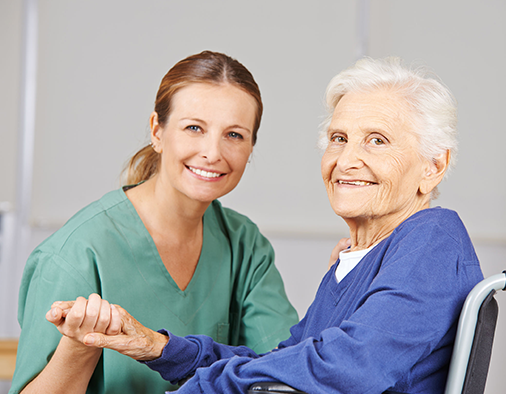Overview
Assisted living is for the adult who needs help with everyday tasks, but desires to live somewhat independently and do not need full-time nursing care. They may require various levels of help in dressing, bathing, eating, toileting, or ambulation/transportation to other areas. Many assisted living facilities are part of retirement communities or a senior housing complex, and may be in close proximity to or even a part of a nursing home or a long-term care facility with full-time nursing care if the patient needs this level of care.
This comprehensive program prepares learners for a position as an Assisted Living Technician. Emphasis is on providing care to clients living in retirement communities or senior housing complexes where full-time care may not be required, but an understanding and professional staff is necessary to be there for them when needed. Seniors in these communities may require various levels and types assistance depending on their specific situation, needs and wants. Assisted Living Technicians are compassionate, caring and skilled healthcare professionals that provide this assistance or care for the peace of mind of both the senior population in their charge and the families who wish to see their loved ones continue to thrive in their later years. This program will ensure learners are prepared to provide a variety of essential services for their clients with the compassion, sensitivity and understanding necessary to provide care when needed and independence when not. Beyond the medical training provided, this course will ensure students have full understanding of the assisted living environment.
Program Objectives
After completing this program, learners will be able to:
- Describe long-term care in terms of the target populations, environment, care options, general costs, services, and regulations
- Describe the physiological, psychological, and sociological changes related to aging
- Describe memory care needs and options for individuals with diseases and disorders
- Explain proper procedures for infection control in a home or residential environment
- Explain the proper procedures for performing basic housekeeping procedures
- Explain procedures and strategies for planning, purchasing, and serving food
- Explain the proper procedures for safely assisting an individual in activities of daily living
- Explain procedures for preventing fluid overload and dehydration
- Explain proper procedures for applying a variety of warm and cold applications
- Describe important considerations and practices for offering activities and programs commonly in assisted living environments
- Explain procedures involved in caring for individuals with special needs such as cancer, immunosuppressive disorders, mental health issues, substance abuse disorders, specimen collections, changing dressings, testing blood glucose, administration of medication, and performing other types of common specialized care
- Describe effective and appropriate care of an individual who is dying
- Explain rehabilitative therapies for individuals in a residential environment
- Explain common preoperative and postoperative care procedures
Certifications
There are several National Certification exams that are available to students who successfully complete this program:
- National Healthcareer Association (NHA) Certified Clinical Medical Assistant (CCMA) Exam
Note: Inclusion of National Certification exam vouchers vary from school and payment / finance method. To check if they are included, you may message any of our advisors through any of our available channels here
*NOTE: May vary based on education grant that will be used
